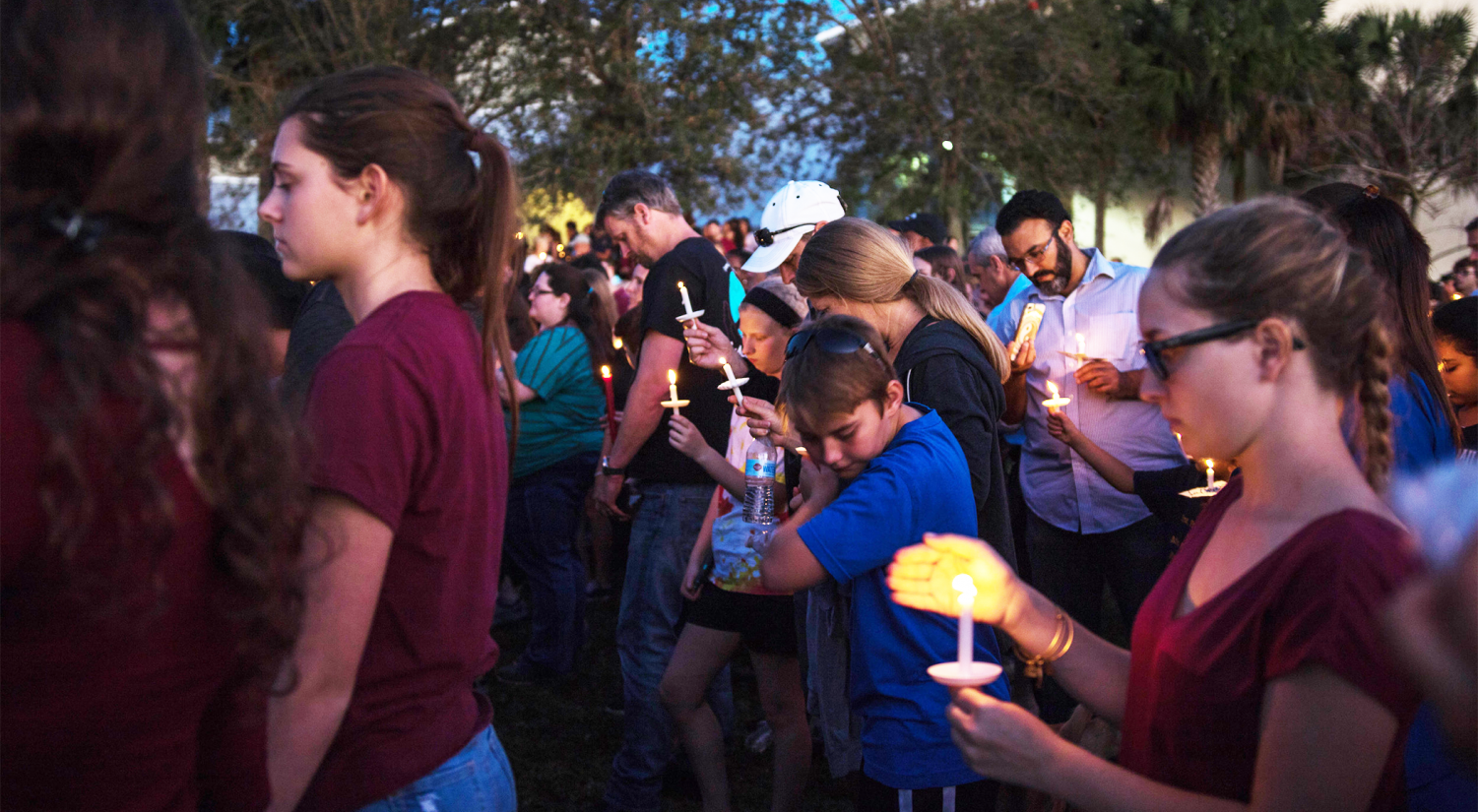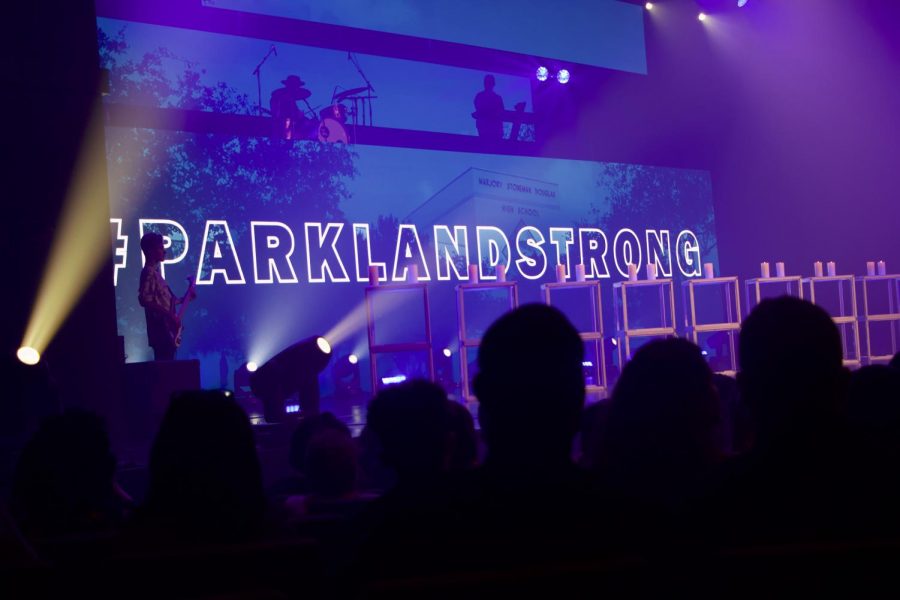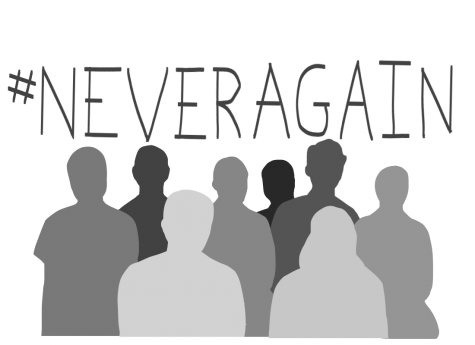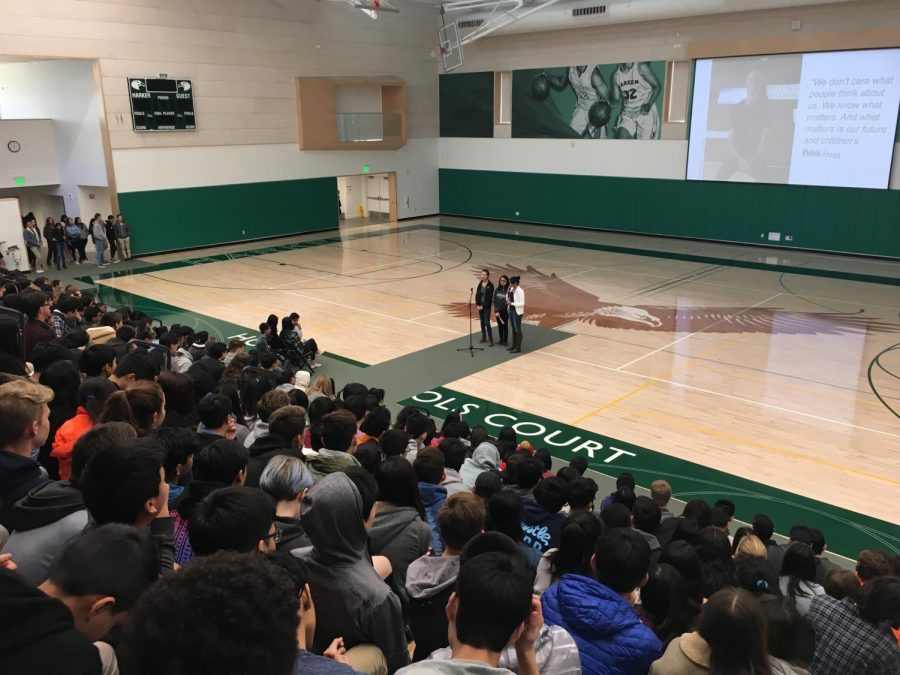#NeverAgain: Three weeks after the MSD High School shooting, Florida students and teachers take a stand on gun control, sparking debate and catalyzing renewed political activism
March 6, 2018
Marjory Stoneman Douglas (MSD) senior Emma González, 18, came to school on Feb. 14 thinking about a test she was going to take.
It was also Valentine’s Day, and as president of the Gender-Sexuality Alliance (GSA) club, she had organized what she called a “love table,” where students could write messages to one another on pink paper hearts. For her, it was just a sweet and goofy way to celebrate love.
Within the hour, a gunman opened fire on campus.

“Someone actually came up to me [on Feb. 26] and said, ‘Thank you for making that table because that was the last thing I gave to my friend before she died, and it was an opportunity to tell her that I loved her before she died,’” González said in an interview with the Winged Post.
González delivered a speech at a Fort Lauderdale gun safety rally two days after the shooting. Her message, which garnered over 2 million views in one week, resonated with an entire generation: “I call BS.” She coordinated rallies, challenged policymakers and appeared on national television, and two words carried her through it all: “Never again.”
“As I was writing it, I went along with whatever was going through my mind,” González said. “I thought ‘We Call BS’ sounds good, and if I can say it enough then I can maybe get people chanting. I was just like ‘I’m so angry, and I cannot–’ and I was kind of looking towards the politicians, thinking, ‘If I could say this to their face, oh god, what would their emotions be, what would their face turn to?’ I was less thinking of someone as an inspiration and more using the politicians as a negative inspiration to help me form my words better. They’re too easily influenced by money, and they’re not listening to the people who voted them into office in the first place.”
Along with fellow MSD seniors David Hogg and Cameron Kasky and nearly 20 other MSD students, González co-founded Never Again MSD, a student-led organization dedicated to promoting gun safety and legislative reform.
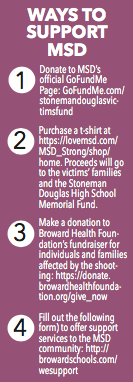
The campaign first gained traction on Twitter and soon spread to other social media platforms, with users posting #NeverAgain to express their advocacy for gun control and their solidarity with the survivors of the MSD shooting.
“If you know what you’re going to say, say it powerfully,” González said. “Don’t take no for an answer. Get a lot of people around you in support of what you’re doing. Get a well-thought out organization with a plan of how to work things and talk to people, because you’d be surprised how many are listening.”
According to González, Kasky created the organization’s name to echo the “Never Forget” slogan of the Holocaust, as he has Holocaust survivors in his family.
Hogg, a member of MSD’s broadcast program, started filming as he sheltered in place as the shooting unfolded.
“I realized that if I was about to die, I wanted to tell a d*** good story,” Hogg said. “And one that people wouldn’t forget. Even if I died on that floor and my blood with 65 others was spilled out and splattered across our floor, we needed to have our voices echo on, even if our souls couldn’t carry on.”
González and Hogg and others have gotten hundreds of interview requests per day, talked to dozens of national media outlets, energized crowds at rallies, confronted the NRA and debated state and national legislators.
“I think that a lot of the students that weren’t–and the teachers that weren’t–in that building are the ones that have been the most outspoken because we feel like it’s our responsibility because there are other people that are not ready, and there are other people that have no voice, and we’ve been their voice,” MSD English and creative writing teacher and newspaper adviser Melissa Falkowski, 35, said. “I’m really proud of [the students] and what they’re doing. They’re trying to turn it into something more positive [and] make us more than just a victim school.”
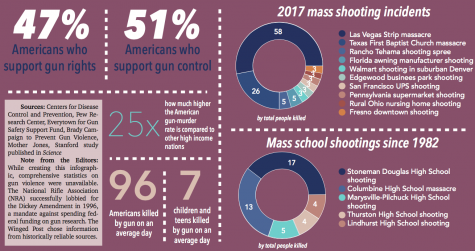
On Feb. 20, MSD students travelled to Tallahassee, Florida, to meet state legislators and witness a vote on proceeding to debate a bill banning assault weapons. The debate did not receive a majority vote and did not take place.
For the MSD student activists, the vote was a letdown, but it certainly wasn’t the end—in fact, it’s only the beginning of an era of political activism in which they plan to take a central role.
“The politicians won’t [do anything now]; they don’t care. [We have to get] these individuals out of office and hold our elected officials accountable for the rest of our lives,” Hogg said. “They care about money. They’ve been habituated and manipulated by power. And they’ve succumbed to the illusion that power even exists. That’s really what’s going on here. I want you guys to feel the blood coursing through your veins right now.”
The Never Again MSD movement is organizing a national “March for Our Lives” and protest for gun safety on March 24, out of which numerous sister marches in major cities nationwide have developed, akin to January’s Women’s March.
As two of the leaders of the Never Again movement, González and Hogg have taken on the role of full-time activists. Three weeks ago, they were second semester seniors like any other.
“Normally, I would be at home watching a lot of Netflix, embroidering all of my clothes and trying to hang out with my friends as much as possible,” González said. “But now, I’m trying to scale down on TV appearances because I don’t like [them]. I have a lot of things that I need to write now for magazines, I have to field a lot of text messages that are saying ‘what are you doing, what are you doing, what are you doing?’ and ‘please meet with us because we deserve to have your voice on our show.’”
Media attention and a Wikipedia page were not what MSD activists had in mind when they started speaking out, and they’re not what they are seeking now.
In the short term, they want to spread their voice through social media and stay on people’s radars, facilitating a lasting discussion of and change in gun control. In the long term, they hope to stay active through the midterms, encourage more young people to vote and see a concrete change in gun legislation.
“We want the age at which one can buy a gun to be moved to 21, we want increased background checks and we want increased mental health care,” González said. “Mental illnesses are unrelated to gun deaths and shootings. It’s just that when they get together, they’re really bad, and that’s when they’re like, ‘This white man was mentally ill.’ You know, some people are just born evil, and all they want to do is to create the max amount of havoc and have a name for themselves. They’re kind of copping out on that by making [mental illness] their scapegoat when, in fact, it is mainly the guns to blame for how bad the incidents get. You would not be able to kill that many people with a knife.”
While the movement has sparked a surge of activism across the country, many have spoken out against the campaign’s stance on gun reform and criticized the efforts of MSD student activists.
“I ignore [the hate]. If you acknowledge it and try to explain it, you kind of end up feeding into it. At the end of the day, those people try to undermine who we are as students, they try to attack our personalities, our mannerisms or [that we] feel happy for 0.2 seconds after a tragedy like this,” González said. “The reason why they do that is because they don’t want to believe that so many kids could be so much more well-spoken than they are, or that maybe we have an actual point.”
Hogg views the critics–some of whom have accused him and other students of taking advantage of the tragedy or being “crisis actors”–as free advertisers for the Never Again cause. He wants to focus his activist efforts on the upcoming march, passing legislation, the 2018 midterm elections and his own higher education, as does González.
“This is not a Democrat or Republican issue,” Hogg said. “This is an issue of lives. We need to work together on this if we want to save our future and our children’s lives. Because if we don’t, how many more are going to have to die?”
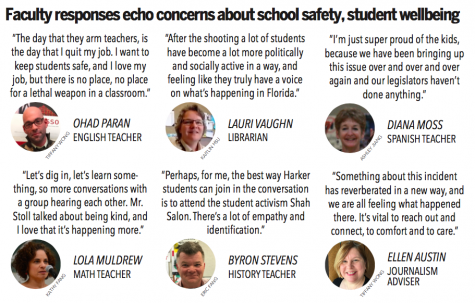
Additional reporting by Anjay Saklecha and Winged Post staff.
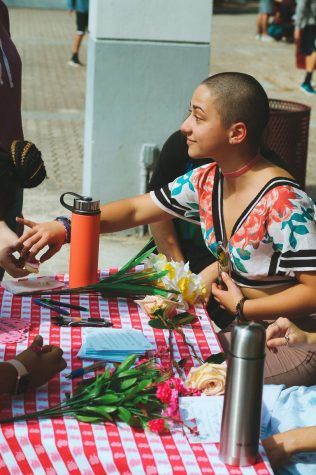
Emma Gonzalez greets students at a GSA-sponsored “love table” on Valentine’s Day (just hours before the shooting). Gonzalez delivered a speech on gun safety at a Fort Lauderdale rally just two days after the shooting.
Leading a movement
Emma González, 18, a leader of the Never Again MSD movement, is the president of GSA at MSD. In her free time, she watches Netflix and embroiders.
“Learn to love each other. Be nice to each other.”
Winged Post: As to the national movement, how do you feel about the schools planning to participate in the March 14 walkout and the cities that are planning their own March For Our Lives events?
Emma González: We are so incredibly supportive of all of the people who are joining us. I could not be happier that they’re going out there and doing what they’re doing. We cannot thank them enough for the support that they’re showing.
WP: What would you say is the major problem with those in political office right now who seem to be taking inaction on gun control?
Emma González: They’re too easily influenced by money, and they’re not listening to the people who voted them into office in the first place. They don’t seem to care about the young voters because they think that the old voters will hold them up, but they forget that the old voters are parents, and that their kids are incredibly influential, especially at this point in time, and I can’t believe that bill got voted down yesterday… How stupid can you get!? We’re going to remember their names. I am going to make a cheat sheet, so that people can remember what their names are when the midterm elections come around.
For the full version of Emma’s interview, click here.
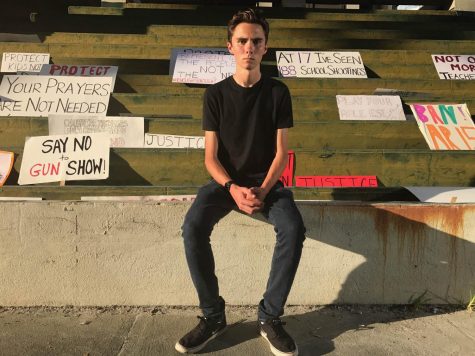
MSD student David Hogg sits in front of posters advocating for gun control after the Feb. 14 shooting. David is a leader and founder of the Never Again MSD movement.
Voice of change
David Hogg, 17, a leader of the Never Again MSD movement, owns a Jack Russell-Westie mix named “Tater” and heads the Drone Club.
“Tell a d*** good story. It might be your last.”
Winged Post: I know the Never Again movement was co-founded by several students at your school. Do you have an idea of how many students are speaking up and getting involved in this movement?
David Hogg: Around 20. Don’t ask me to name names, I don’t know all of them, but they’re mainly TV and drama kids that are honestly the misfits of the school that have been bullied, people that have always been called out for their uniqueness like Emma and things like that. And that’s part of what’s kept us strong. We don’t give a s***, we don’t care what people think about us. We know what matters. And what matters is our future and our lives.
For the full version of David’s interview, click here.
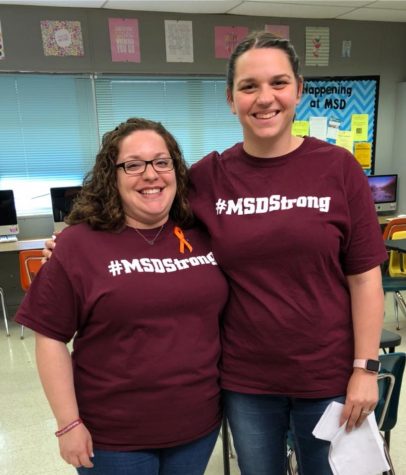
Melissa Falkowski poses with a colleague in an #MSDStrong t-shirt. Falkowski, 35, teaches creative writing and English and advises the newspaper at MSD.
Courage to teach
Melissa Falkowski, an English teacher and newspaper adviser at MSD, is the mother of two young children.
“It’s an amazing feeling to know that you’re not alone.”
Winged Post: Now that classes have resumed, how has the atmosphere changed, and what is like being back at the school?
Melissa Falkowski: My fifth period has a student in it who lost his sister. So there’s classes that have to deal with that, and there’s other classes where there’s going to be an empty desk. I’m not really sure how Wednesday is going to go, but I bought a lot of tissues, and there’ll be a lot of hugs, and that’s kinda all I know I guess, at this point.
WP: A lot of people have come to us asking what they can do. We’re trying to plan something right now. How can we send our support and solidarity, and where should money that people donate go?
MF: I’m just really thankful for the people who have donated to the journalism GoFundMe and the victims’ fund and the march and just have been so supportive and sending messages and support. It’s an amazing feeling to know that you’re not alone. Everyone asked what can we do; at this point we don’t know ourselves, but it’s just nice to be asked.
For the full version of Falkowski’s interview, click here.
Editorial: Courage and activism of MSD survivors provide hope for change
It happened again. Another mass shooting at yet another school—yet another senseless tragedy. Yet another evening news broadcast full of crying faces of children and parents mourning the 17 lives cut short by yet another young white male, this time on Valentine’s Day, this time in Florida.
Any mass shooting in America today is met with a dual response: a popular outpouring of empathy and support for the shooting victims—and a silent resignation that, despite any words and activism and frustration, “Nothing will change.”
It’s easy to fall into this mode of thinking—we’ve certainly had our hopes crushed before. Perhaps the 13 deaths at Columbine High School will be the last tragedy, galvanizing people (and Congress) to action. No, perhaps the 32 college students of Virginia Tech will be the last deaths. Perhaps the 13 dead soldiers at Fort Hood will. Perhaps the 27 children and adults of Sandy Hook. Or the 49 people crowded into Orlando’s Pulse Nightclub. The 58 concert attendees in Las Vegas. 26 people at Sunday church services in Sutherland Springs—
And here we are again: a mass shooting at Marjory Stoneman Douglas High School (MSD) in Parkland, Florida.
In the aftermath of this new shooting, each of us must again face a personal crossroad: will I hold out hope for change? Or will I resign myself to cynicism?
But perhaps—this time—there is finally reason to believe change is coming.
Winged Post reporters spent several hours last week talking to MSD students Emma Gonzalez and David Hogg and MSD journalism teacher Melissa Falkowski. The students have started the Never Again movement, with a March for Our Lives on March 24, and they plan to continue after high school and into college their work that has begun to enact stronger gun control in the U.S.
We spent many hours reading and writing about the earnestness, anger, bravery and intelligence that MSD students have mustered through an unimaginably difficult tragedy.
Their courage caused us to tear apart and redesign this Winged Post issue to spotlight their activism and to shine a light on America’s gun epidemic. We transcribed 12,000 words and wrote 5,000 more in 48 hours about MSD students and their efforts for gun control.
We talked to our own Harker teachers and students and staff, on the record as journalists and off as humans, about how they feel after another school shooting, about where our school’s concerns lie and about the changes we want to make.
Everyone we’ve spoken to in the last two weeks has said “Change is happening.” And if you want to be a part of change? Wonderful.
Let’s talk politics. Inspired by everyone we’ve talked to, here’s a few suggestions for amplifying your political engagement.
No matter what, register to vote. Then, when you turn 18, vote. Then vote again. And again. Vote in every election—school, city, state, national—for the rest of your life.
Call people out. Encourage them to join you in doing something.
See our centerspread for a how-to guide for activism.
Go to a march. Or create a new one for something you believe in.
Put your time or your money where your mouth is. Emulate the Gates and the Chan-Zuckerbergs of the world: amplify and bolster those whose ideologies and ideas you support.
Join a political campaign. Spend this summer working for a 2018 congressional candidate you wholeheartedly believe in. If you’re not happy with our Congress, try to change its balance. If you’re fine with it, work to keep Congress where it is.
Raise funds for candidates you know will make a change. Send letter after letter after letter on issues of concern to your elected officials until they listen. Physically show up to the offices of lawmakers who right now could (but aren’t) supporting solutions instead of creating more problems.
Read as much as you can. Scour candidates’ platforms and the intricacies of tax reform like you do Stranger Things or the NBA or machine learning.
Take what you know and teach other young people. Amplify each other’s voices. Debate. Change people’s minds. Show them new ideas. Find some new ones yourself.
Fail, but try again. Keep waiting, but be patient.
It’s easy to forget Washington or Sacramento or San Jose leadership as areas for kids in the middle of Silicon Valley to pursue, when the familiarity of tech sounds a siren song so seductive.
But now maybe Washington—and its political leadership (or lack thereof)—needs you more than do the already-crowded halls of Google and Facebook and university labs and biotech startups.
Maybe some of you read- ing this will consider the lifelong route of a career in political service. Do it. Major in political science, go to law school and then run for office yourself. When you’re elected, make a d*** difference.
Define what kind of generation we’re going to be and what you want your role in our generation to be, starting right now.
What the MSD students’ activism has shown us most potently is that you don’t know what you’re capable of until you start.
And we’re all ready to start.
School shooting in Parkland, Florida kills 17
A gunman killed 17 people—14 students and three faculty—at Marjory Stoneman Douglas High School (MSD) in Parkland, Florida on Feb. 14.
The 19-year-old gunman, a former student who was expelled for disciplinary reasons, set off a fire alarm to draw students and teachers out of their classrooms just before the end of the school day. He opened fire in the freshman building of the school, killing 17 and injuring more than a dozen. He was armed with an AR-15 style semiautomatic rifle and was at large for more than an hour before being taken into police custody.
Melissa Falkowski, 35, who teaches English 3 and Creative Writing and advises the newspaper, hid 19 students in the closet of her journalism room during the shooting.
“We were [all] standing in the closet–so you gotta try to keep it light, because it’s hot and there’s a lot of kids in there,” Falkowski said.
The gunman confessed to the shooting and was charged with 17 counts of premeditated murder and denied bond. Last year, the FBI was contacted about a YouTube comment posted by a user with the same name as the gunman that read “I’m going to be a professional school shooter.”
The FBI released a statement on Feb. 15 confirming that they investigated the comment but could not verify any actionable information.
“No other information was included in the comment which would indicate a particular time, location or the true identity of the person who posted the comment,” the statement read.
The shooting at MSD is the deadliest school shooting since 2012, when 20 first-graders and six adults were killed at Sandy Hook Elementary School, and among the deadliest in modern U.S. history. And, less than 50 days into 2018, it’s already far from the first school shooting this year.
The shooting has reignited the gun control debate in full force, with many legislators pushing for a ban on bump stocks, gun addendums that increase their firing rates.
President Trump offered his prayers and condolences to the victims’ families, tweeting “No child, teacher or anyone else should ever feel unsafe in an American school” the day of the shooting.
Trump, in a meeting with lawmakers on Feb. 28, told members of Congress that they should not be afraid to defy the NRA in passing a comprehensive school safety package. At one point, Trump urged taking guns away from anyone considered dangerous, even before they have the opportunity to defend themselves in court.
“Take the guns first, go through due process second,” he said in a publicly televised meeting on Wednesday.
Trump’s remarks about seizing guns and the NRA were considerably different from his comments at the Conservative Political Action Conference, where his main objective was to spread his message of arming teachers, barely mentioning background checks or raising the age limit to purchase a weapon.
In response to the students who have seized control of the national gun policy debate, companies such as Delta, Dick’s Sporting Goods and Walmart have cut ties with the NRA. Dick’s Sporting Goods announced Wednesday that they will enact tougher gun sale restrictions and stop selling assault-style rifles, CEO Edward Stack announced on the Dick’s Sporting Goods official webpage.
Upper school supports MSD through banner, donations
Ellen Austin
Winged Post Co-Editors-in-Chief Kaitlin Hsu (12) and Sahana Srinivasan (12) and Harker Aquila Editor-in-Chief Meena Gudapati (12) announce the new issue of the Winged Post during the school meeting. Harker Journalism conducted interviews with MSD students Emma Gonzalez and David Hogg as well as MSD journalism teacher Melissa Falkowski for coverage of the shooting.
The upper school community is organizing a fundraiser, assembly and banner in support of MSD and its students.
Esha Deokar (11) proposed the idea of hosting a series of school events in support of MSD as student council simultaneously began discussing a walkout, which will be an optional assembly, and a gun debate town hall.
“As a community in California where most of us are almost desensitized to the events happening outside our bubble, I think it’s important to show our solidarity to the high school students who are campaigning for more gun control,” Esha said. “The main thing would be logistics and getting the word out.”
She and student council are now working together to organize an upper school-wide banner for MSD and plan to hold the fundraiser for the victims the weeks of March 12 and 19, with all proceeds going to the victims’ GoFundMe and the MSDStrong website.
On March 14, the upper school will hold an optional assembly for 17 minutes, one minute for each victim, when students can walk out during a break in advisee review meetings in solidarity with the students at MSD and in parallel with schools nationwide.
“With the fundraiser, [student council, the administration and Esha] really wanted to make an effort to honor the victims of the Parkland shooting and support the school through everything,” junior class treasurer Shania Wang (11) said. “We have three main purposes [for the walkout]—gun control, solidarity and supporting the victims.”
Students can send laminated, non-political banners, preferably not mentioning victims’ names or the date of the shooting, teddy bears, candles and flowers to voice their support, express solidarity and honor those who passed away.
Individuals can contribute to a GoFundMe created for the victims by the Broward Education Foundation, to the school as a whole via a MSD Strong website–where MSD merchandise is available–or to the MSD student journalism program’s GoFundMe.
“I’m just really thankful for the people who have donated to the journalism GoFundMe, the victims’ fund and the march. [It’s] been so supportive, sending messages and all,” MSD journalism teacher Melissa Falkowski said. “It’s an amazing feeling to know that you’re not alone.”
Additional reporting by Winged Post staff.
This piece was originally published in the pages of the Winged Post on March 6, 2018.
MSD staff, faculty return to classrooms and begin recovery after tragedy
MSD held an optional reunification event for faculty, students and parents on Feb. 25, intended for community members to provide comfort and be comforted as the school reopened.
“It was basically a three hour-long open house, but a lot more emotional, where everyone needs a hug,” Melissa Falkowski, 35, who teaches English 3 and Creative Writing at MSD and advises their print newspaper, said. “It went well, but you could tell the kids, the parents—they’re still sort of hesitant.’”
Faculty then returned to campus on Feb. 26 to 27 to discuss how best to help their students and community and how the school plans to work in the coming weeks.
“We’re sort of in this really unknown situation, like where do we go now?” Falkowski said. “I was supposed to give a quiz on Feb. 15–what are we doing about that? One of the students sent me a text message yesterday asking me when our children’s book was due for our creative writing class. I’m like, ‘Never?’ I don’t know. Everyone’s calling it a new normal, and we’re still figuring out what’s next.”
Half-day classes resumed on Feb. 28, and students were greeted by banners, teddy bears, flowers, candles and cards sent in solidarity from around the nation.
On the weekend of Feb. 24, the MSD varsity ice hockey team took home a title at the Florida Hockey State Championship. The players dedicated their win to the victims of the shooting.
“Before the game, we all knew what we were there for,” the team’s assistant captain Tyler Avron, a senior at MSD, said. “We had the opportunity to not go in case some of us were feeling not well with the situation, but we chose to go and represent our school. That was motivation–that we were fighting for more than ourselves.”
MSD shooting sparks gun control conversation
Since the shooting, students in Parkland and around the U.S. have taken control of the gun debate and are pressuring Congress to pass gun control legislation. They have appeared on TV through town halls and in the streets protesting as they continue to plan more marches in the coming weeks.
Students have been calling for a ban on assault-style weapons and tighter background checks, using this tragedy as a rallying cry for gun control at a national level.
Any kind of gun control under a Republican president would be monumental since the party’s base has always pressured lawmakers to support pro-gun legislation. But Trump is facing a different kind of pressure in the opposite direction–the voices of the surviving students of the Parkland shooting.
“‘Never Again’ means that we really want to make sure this never happens again. Gun legislation is just a part of it; we want increased background checks so that the people who really want to do a lot of damage with specific types of guns—and guns in general—can’t get their hands on guns,” Emma González, MSD student and co-founder of the Never Again MSD movement, said. “Specific guns, like military-grade weapons, assault rifles, semi-automatic weapons, would not be allowed to be purchased.”
The Republican-majority Florida Senate met on Monday and passed legislation to raise the legal age for purchasing a firearm to 21, allow authorities to take away guns from anyone with mental health problems and permit training for teachers to carry firearms in school. However, the bill rejected an amendment that would have banned assault rifles like the AR-15 gun that was used in the shooting.
“[Politicians are] too easily influenced by money, and they’re not listening to the people who voted them into office in the first place. They don’t seem to care about the young voters because they think that the old voters will hold them up, but they forget that the old voters are parents and that their kids are incredibly influential, especially at this point in time,” Emma said. “I can’t believe that bill got voted down yesterday… how stupid can you get? How stupid? We’re right here! And it got voted down! We’re going to remember their names.”
The idea of arming teachers resonated with President Trump, as he voiced his support for this measure during a gathering with governors at the White House on Monday. However, the idea has garnered controversy nationally as the proposal initially caused dismay.
“I feel that I would much rather see our government take on some more effective measures to eliminate automatic weapons and raise the age to 21 for the purchase of weapons. I would like to see better background checks, I would like to see better restrictions placed before we consider arming teachers,” Spanish teacher Diana Moss said. “I just think that having weapons in a place where kids could have access to them does not make schools a safer place.”
On Feb. 20, survivors of the deadly Florida high school shooting took on lawmakers and the National Rifle Association (NRA) at a heated town hall. The community affected by the shooting confronted Sen. Marco Rubio after he refused to support a ban on assault weapons and promised his continued support for the NRA and other organizations in favor of pro-gun legislation. A spokesperson from the NRA was also present at the town hall and advocated for the group’s pro-gun initiatives.
Despite these efforts, House Speaker Paul Ryan said on Monday that Republicans would focus on reducing law enforcement failures in the future rather than tighter gun control.
